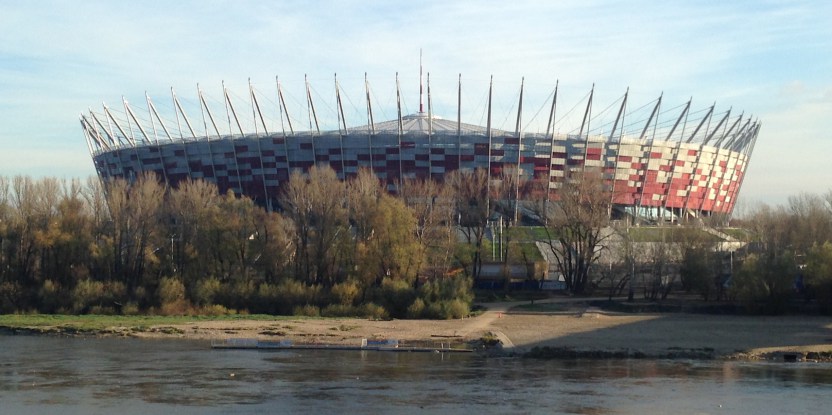
Delegates are gathering at the cavernous National Stadium in Warsaw this week to whittle away at sticking points surrounding the U.N.-backed REDD+ program that ground international climate change negotiations to a halt last year in Doha, Qatar.
Few expect a major breakthrough on a climate deal at COP19, but many anticipate that negotiators will make headway in working out details related to setting standards for such critical components as financing, and monitoring, reporting and verifying (MRV) greenhouse gas emissions.
Since it began in 2008, REDD+ has evolved from the rather straightforward premise of giving financial remuneration to countries for maintaining forests — as providers of ecological services — by leaving trees standing, into a much more complex and mature framework.
Negotiators are in the tricky position of having to overcome many social and economic hurdles if the REDD+ mechanism is to be successful. If the world is serious about enabling the role of forests in climate change mitigation, the mechanism must be developed through international cooperation, new models of international collaboration in a democratic and transparent manner.
A large number of countries are involved, and actors represent a wide range of government and civil society sectors that have varying degrees of strength, influence, understanding and mutual trust. However, progress is slow at the national level in policy arenas of countries engaged in making REDD+ work. At the global level, key parts of the REDD+ framework and financing are not secured.
About 500 experts on REDD+ gathered just one week ago at the Oslo REDD Exchange 2013, the second conference of its kind sponsored by the Norwegian Agency for Development Cooperation (NORAD). It provided an opportunity to reinvigorate the REDD+ agenda and motivate many involved with REDD+ in the run-up to the 19th international climate summit, the U.N. Framework Convention on Climate Change (UNFCCC) Conference of the Parties starting this week in Poland’s capital.
The unusual format of the Exchange was a fresh diversion from the usual conference style. It consisted almost entirely of panel debates organized around four different themes including landscapes, commodities, analysis and consensus — areas that form NORAD’s research portfolio.
Organizers departed from the typical scientific conference format of “show-and-tell” by engaging speakers from developing countries and civil society who are active in making REDD+ a reality. This made this an especially lively and enlightening event.
A “Results Bar” allowed a selected 15 of the 41 organizations funded by NORAD and the government of Norway’s International Climate and Forest Initiative to present their project results.
Hopes are high that delegates in Warsaw at the Conference of the Parties will make strong and decisive decisions on REDD+
Several scientists involved in the Center for International Forestry Research (CIFOR) Global Comparative Study on REDD+ were present at the Results Bar and joined in discussions about whether REDD+ is a threat or opportunity for the rights of local people, the role of payment for performance, and the improvement of national systems for MRV.
In 2012, CIFOR published “Analysing REDD+,” a book summarizing its Global Comparative Study, which emphasizes the importance of scaling issues in REDD+.
For example, one topic the book tackled was about how maintaining information streams and coordination between international, national and subnational levels of government is important for REDD+ governance.
Land tenure rights issues are crucial for villagers implementing REDD+ schemes. Although efforts are being made to resolve questions over land tenure at the local level, national law must address it in an unambiguous and transparent manner.
Determining carbon levels and measuring greenhouse gas emissions is crucial for REDD+, but many countries struggle to develop their national capacities to measure and handle such complex data.
It is important to develop a step-by-step approach to MRV that enables countries with differing capacity levels to participate meaningfully in REDD+. A stepwise approach would be helpful in many other aspects of climate change mitigation, enabling countries to slowly build up technologies, capacities and reliance in REDD+ while the mechanism evolves.
It is often stressed that climate change requires urgent action, but transparency of the international process leading up to it must be ensured, as it will be key to the sustainability of any agreement.
Hopes are high that delegates in Warsaw at the Conference of the Parties will make strong and decisive decisions on REDD+.
For more information on the topics discussed in this article, please contact Christopher Martius at c.martius@cgiar.org
This work forms part of the CGIAR Research Program on Forests, Trees and Agroforestry.
We want you to share Forests News content, which is licensed under Creative Commons Attribution-NonCommercial-ShareAlike 4.0 International (CC BY-NC-SA 4.0). This means you are free to redistribute our material for non-commercial purposes. All we ask is that you give Forests News appropriate credit and link to the original Forests News content, indicate if changes were made, and distribute your contributions under the same Creative Commons license. You must notify Forests News if you repost, reprint or reuse our materials by contacting forestsnews@cifor-icraf.org.
